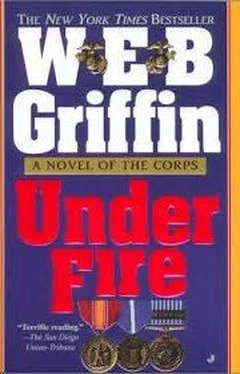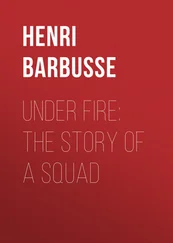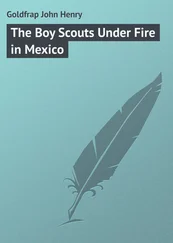Griffin W.E.B. - The Corps 09 - Under Fire
Здесь есть возможность читать онлайн «Griffin W.E.B. - The Corps 09 - Under Fire» весь текст электронной книги совершенно бесплатно (целиком полную версию без сокращений). В некоторых случаях можно слушать аудио, скачать через торрент в формате fb2 и присутствует краткое содержание. Год выпуска: 0101, Жанр: Старинная литература, на английском языке. Описание произведения, (предисловие) а так же отзывы посетителей доступны на портале библиотеки ЛибКат.
- Название:The Corps 09 - Under Fire
- Автор:
- Жанр:
- Год:0101
- ISBN:нет данных
- Рейтинг книги:5 / 5. Голосов: 1
-
Избранное:Добавить в избранное
- Отзывы:
-
Ваша оценка:
- 100
- 1
- 2
- 3
- 4
- 5
The Corps 09 - Under Fire: краткое содержание, описание и аннотация
Предлагаем к чтению аннотацию, описание, краткое содержание или предисловие (зависит от того, что написал сам автор книги «The Corps 09 - Under Fire»). Если вы не нашли необходимую информацию о книге — напишите в комментариях, мы постараемся отыскать её.
The Corps 09 - Under Fire — читать онлайн бесплатно полную книгу (весь текст) целиком
Ниже представлен текст книги, разбитый по страницам. Система сохранения места последней прочитанной страницы, позволяет с удобством читать онлайн бесплатно книгу «The Corps 09 - Under Fire», без необходимости каждый раз заново искать на чём Вы остановились. Поставьте закладку, и сможете в любой момент перейти на страницу, на которой закончили чтение.
Интервал:
Закладка:
"Six-one, a hundred ninety."
"And all we'll have to do is squeeze you into a pressure suit, and we can take off."
"How do I get into the Navy base?"
"Alameda will be waiting for you. You're traveling DP, General. Everything is greased. Believe me."
"What's DP?"
"Direction of the President. You didn't know?"
"No, I didn't."
"I'll see you at Alameda, General," General Gruber said, and hung up without saying anything else.
Pickering hung up the telephone and turned to Patricia.
"What was that all about?"
"I'm to be flown to Washington by an Air Force brigadier in a fighter I never heard of. We leave in two hours frem the Alameda Naval Air Station."
Patricia Fleming considered that.
"I'll drive you," she said. "It won't take us two hours to get to Alameda, Flem."
"The Air Force guy's coming from Las Vegas. He says he can do that in forty minutes. But I told him two hours," Pickering said.
"Why?"
"I have something-something important-I want to do here first."
"What could possibly be more important than-?" She stopped in midsentence, having taken his meaning.
"The same thing I had in mind when we got on the ele-vator thirty, forty minutes ago," he replied.
She looked at him for a moment, then smiled.
"Oh, Flem, I hope you never grow up."
[FOUR]
THE PRESS CLUB
TOKYO, JAPAN
1130 26 JUNE 1950
It has been said that while there just might be honor among thieves, there is absolutely none among journalists, at least insofar as beating a fellow member of the fourth estate out of a story-"getting it first"-is concerned.
But there is a little "scratch my back and I'll scratch yours" cooperative activity among journalists, and so it came to pass that when one distinguished member of the Tokyo press corps got it reliably that an Air Force C-54 was about to leave for Seoul to evacuate American depend-ents, he told one of his peers.
"That makes us even, right?" he asked, so that things were understood between them.
"Right," the second journalist said, then retired to the pri-vacy of his room to pick up his typewriter and his camera and a change of linen. While there, he remembered he owed a big one to a third journalist, and went to his room on the third floor of the Press Club Building, made sure he was alone, and then brought him in on the C-54 about to leave Haneda for Seoul.
It never entered the mind of any of the three journalists to inform Miss Jeanette Priestly, of the Chicago Tribune, of the Seoul-bound C-54. Whatever special courtesies her gender and all-around good looks might otherwise have seen coming her way were more than neutralized by their shared belief that she was one of the more skilled practi-tioners of their profession, and thus to be treated as they treated any other of their peers. Screw her, in a metaphori-cal sense, not to be confused with the physical.
The three-who had left the Press Club at different times, one of them by the kitchen door-were therefore disappointed but not really surprised when they met at Haneda Air Base base operations and found Miss Priestly there.
They were disappointed because there would now be four dashing and courageous journalists on the first plane to the war in Korea, not just three, and one of the four was of the gentle sex, which unquestionably diluted the Richard Harding Davis aura of their journey.
Davis was a hero to all three men, who all very privately hoped to emulate him. He had covered every war from the Greco-Turkish through World War I, managing along the way to charge up San Juan Hill with Teddy Roosevelt in the Spanish-American War, and nearly get himself shot by the Germans as a spy in World War I. He then went on to be a highly successful novelist and playwright.
But there was nothing they could do about the comely Miss Priestly. She was duly accredited to the headquarters of the Supreme Commander, and thus just as entitled as they were to space-available accommodations on USAF transports.
And there was plenty of space. There was no one on the C-54 when it took off from Haneda but the five members of the crew and the four members of the press corps.
As they approached Seoul's Kimpo airfield, the pilot came back into the fuselage to tell them that, since North Korean Yak fighters had strafed the field and were likely to come back, and that since there was a strong possibility that the field had already been captured by the North Kore-ans, his just-received orders were to make a low pass over the field to see if there were any Americans waiting for them, and if not, to go back to Japan.
No, he could not land just to let the correspondents off.
There were Americans on the field, some of them franti-cally waving jackets to attract the attention of the C-54.
It landed, and the correspondents found Air Force Lieu-tenant Colonel Peter Scott busily burning documents in Base Operations.
Scott told them things were not as bad as they could be. Seoul had not been abandoned, as reported, and in fact, on direct orders from General Douglas MacArthur, the sixty-odd officers of the Korean Military Advisory Group, and the hundred or so enlisted men attached to KMAG who had evacuated the city, were now in the process of moving back into it.
The journalists asked Colonel Scott how they could get into Seoul, which was seven miles away. He pointed to the parking lot, which was jammed with Jeeps, trucks, and civilian automobiles, including nine recent-model Buicks.
"Most of them have keys in their ignitions," Colonel Scott said.
The male journalists then chivalrously suggested to Miss Priestly that under the circumstances, it behooved her to return to Tokyo aboard the C-54 with the dependents be-ing evacuated, while they went into Seoul. This was really no place for a woman.
Miss Priestly replied with a short pungent sentence that certainly was not very ladylike, but made it clear that she considered herself one of the boys, and had no intention of running away from the story.
The journalists watched the C-54 take off for Tokyo and then climbed into a nearly new Buick and drove into Seoul, where they had little trouble finding the large gray building housing KMAG.
There, Colonel Sterling Wright-who told them he was acting KMAG commander; Brigadier General William Roberts, the former commanding general, having left for a new assignment in the States and no replacement for him having arrived-repeated what they had heard from Lieutenant Colonel Scott at Kimpo: Things weren't as black as they had at first appeared.
For proof of this, he showed them a radio teletype mes-sage from the Supreme Commander himself, which said: "Be of good cheer. Momentous events are pending."
Colonel Wright regretted that under the circum-stances-KMAG had just returned to Seoul; he would make improvements tomorrow-the only accommodations he could offer the distinguished members of the press would be rather spartan. The men would share quarters, as would he, with the senior officers of his staff, and he would turn over his own quarters to the lady.
Miss Priestly took a shower and went to bed in Colonel Wright's narrow bed.
She was awakened in the very early hours of the next morning by an excited lieutenant who reported that the North Koreans had broken through the South Korean de-fense lines around Seoul, and that they were going to have to run for it.
Moments later, the North Koreans brought the KMAG compound under mortar fire.
Miss Priestly dressed quickly and went outside the building, where she found Colonel Wright waiting for her in a Jeep. Her fellow journalists, she was told, had already left.
Followed by another Jeep, they raced out of the KMAG compound toward the Han River. They had almost reached the river when a brilliant flash of light and a terrifying roar announced that the bridge had been blown.
Читать дальшеИнтервал:
Закладка:
Похожие книги на «The Corps 09 - Under Fire»
Представляем Вашему вниманию похожие книги на «The Corps 09 - Under Fire» списком для выбора. Мы отобрали схожую по названию и смыслу литературу в надежде предоставить читателям больше вариантов отыскать новые, интересные, ещё непрочитанные произведения.
Обсуждение, отзывы о книге «The Corps 09 - Under Fire» и просто собственные мнения читателей. Оставьте ваши комментарии, напишите, что Вы думаете о произведении, его смысле или главных героях. Укажите что конкретно понравилось, а что нет, и почему Вы так считаете.










